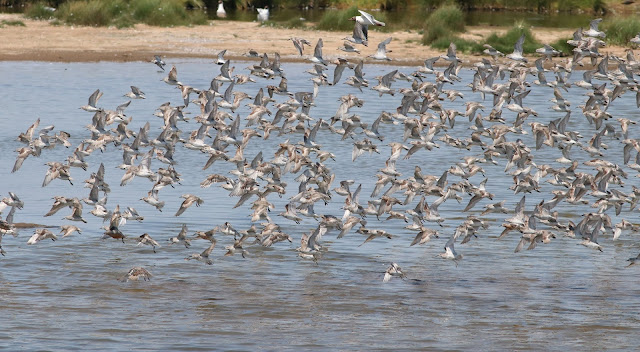Frampton Marsh RSPB
One of the perks of the job is that survey work can take you to some lovely parts of southern England. It felt a bit special being sent to Norfolk for an evening and on the warmest day of the year so far. The evening held onto the humidity, and with clear skies, it was a privilege to have spent it in quiet solitude. A Barn Owl was hunting over the maize field and a Tawny Owl hooted close by. Muntjacs barked, and satellites cruised over while listening to plenty of bat activity.
The following day was booked as annual leave and having observed the heavy traffic creeping south along the A149 the previous evening, there wasn't a chance of joining the throngs of people presumably headed to the pristine beaches of the north norfolk coast. Thinking better of it, I headed over to Frampton Marsh.
With barely half a dozen people there, it was perfect. The heat however was still a factor with temperatures exceeding thirty degrees.
I was surprised by the number of waders present on the reserve. Black-tailed Godwit were numerous, some adorning splendid terrocota upperparts, but the majority in non-breeding plumage. Perhaps these were 2nd calender year (1st summer) non-breeders.
A couple of Green Sandpiper were present on the pools west of the car park. Also further along the channel were four summer plumage Ruff, incredible birds too see at this time of the year and maybe returning failed breeders. A single Spoonbill was present on the pools east of the Visitor Centre.
The main lagoon adjacent to the sea wall was the epicentre of the activity. The floods were full of Knot, a congregation of around two thousand typically grey birds but a few in brick-red plumage.
Two stunning summer plumage Spotted Redshank were feeding alongside both Black-tailed Godwit and Bar-tailed Godwit.
At least six Little Ringed Plover were feeding on the exposed mud. Avocet appear to be doing well here with plenty of independent youngsters feeding on the pools.

Snapping away at this Common Tern, I had no idea it was juggling a recent catch.
A small isolated bush, and a singing Sedge Warbler in fine voice.













Comments
Post a Comment